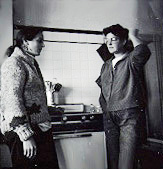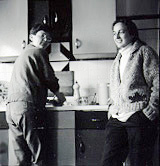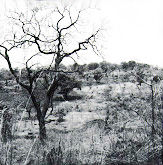
I was a Peace Corps volunteer in Mali,
biking fifteen miles up the road from my village to town. There wasn't much to look at
along the way except for a few small villages, termite mound pastures and mango trees, but
there was plenty of time for reflection.
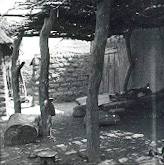
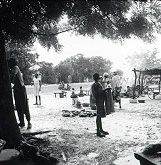
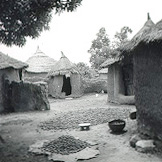

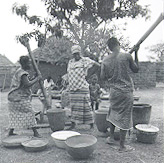
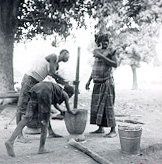

Ah,
the professors! And I remember Aryeh saying
he hated the word "lifestyle" Why philosophy? I wasn't looking for a
"practical" major. I thought the point of going to college was to get a broad
education rather than a narrow one. College was the time to read things and study things
you weren't going to be reading on your own, to study the basic underpinnings, and to help
form the way you thought about all the other things you had to do. Having a whole semester
to read the Confucian Analects, or study Rawls' Theory of Justice, that was
the luxury of higher learning. At eighteen, I didn't know what I wanted to do for the rest
of my life. There was no specific preparatory course for my job. In fact, it didn't even
exist at the time.
 Each philosophy professor at
Haverford had their own style: not just their teaching style, but their personalities,
which extended to their way of speaking, of dressing, the way they treated you outside the
classroom, their personality. Even if my grasp of the subject was shaky, by the end of the
year I knew quite a bit about the professor. I couldn't name five things about the
Dhammapada without checking my notes, but I remember Ashok Gangadean had excellent taste
in clothes, particularly his shoes.
Each philosophy professor at
Haverford had their own style: not just their teaching style, but their personalities,
which extended to their way of speaking, of dressing, the way they treated you outside the
classroom, their personality. Even if my grasp of the subject was shaky, by the end of the
year I knew quite a bit about the professor. I couldn't name five things about the
Dhammapada without checking my notes, but I remember Ashok Gangadean had excellent taste
in clothes, particularly his shoes.

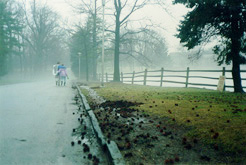

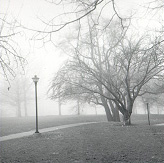 The time of day that a class was held, the time
of year, the room it was held in, and the smell of the room, all contributed to the total
effect of the subject. For example, in Paul Desjardins' class we met early in the morning,
when it felt like we were the only ones awake. I can still recall his lean, tall figure --
always in a suit -- hands behind his back, no visible books or papers, striding up the
path to Gest. We met in those beautiful but odd high-ceilinged rooms with the light coming
through the wooden windows, where I could see my fellow students walking up towards the
dining center, and the trees outside on the green. I'd settle into the wooden chair,
waiting for Paul to begin his extemporaneous, beguiling, non-stop stream of thoughts. That
was all part of the experience.
The time of day that a class was held, the time
of year, the room it was held in, and the smell of the room, all contributed to the total
effect of the subject. For example, in Paul Desjardins' class we met early in the morning,
when it felt like we were the only ones awake. I can still recall his lean, tall figure --
always in a suit -- hands behind his back, no visible books or papers, striding up the
path to Gest. We met in those beautiful but odd high-ceilinged rooms with the light coming
through the wooden windows, where I could see my fellow students walking up towards the
dining center, and the trees outside on the green. I'd settle into the wooden chair,
waiting for Paul to begin his extemporaneous, beguiling, non-stop stream of thoughts. That
was all part of the experience.
 I may be biased in thinking
that philosophy was the essence of the college, but weren't we all engaged in the pursuit
of, and love of, knowledge? I sensed a consistent philosophy underlying the way things
were done at Haverford:
I may be biased in thinking
that philosophy was the essence of the college, but weren't we all engaged in the pursuit
of, and love of, knowledge? I sensed a consistent philosophy underlying the way things
were done at Haverford: - We sat around tables facing each other, encouraging students to participate and feel responsible for the direction of the class.
- The buildings were plain but very much suited to the overall spirit of the place.
- We didn't have a football team, or fraternities.
- We took a perverse pride in being not so well known.
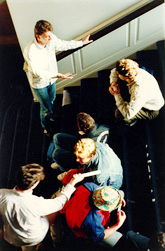 During the annual Plenary and consideration of
the Honor Code, the college's philosophical core was revealed most obviously, when we
debated at length and passionately. We talked about the social Honor Code more than the
academic Honor Code; the academic part was like a job that you did correctly, whereas the
social Honor Code was fluid, and more challenging.
During the annual Plenary and consideration of
the Honor Code, the college's philosophical core was revealed most obviously, when we
debated at length and passionately. We talked about the social Honor Code more than the
academic Honor Code; the academic part was like a job that you did correctly, whereas the
social Honor Code was fluid, and more challenging.
At Haverford, part of the "love of wisdom" and the pursuit of wisdom was also about learning how to handle and understand people, as much as it was about understanding ideas or understanding oneself. Being surrounded by beautiful grounds and buildings, and people who had been there for a long time, like the professors, the groundskeepers, the staff, made Haverford a special place to study philosophy. It was all part of what I learned.
Moving to the Fine Arts camp
 I was a content and happy philosophy major for
the first two years at Haverford. I didn't know what I was going to do with philosophy,
but I was okay with that. Then, in my junior year, I took a photography course from Willie
Williams. Essentially, I became a photography major for the last two years at Haverford.
It's hard to explain, but photography really appealed to me and challenged me, and I felt
that if I worked at it hard enough, I could do some good work with it.
I was a content and happy philosophy major for
the first two years at Haverford. I didn't know what I was going to do with philosophy,
but I was okay with that. Then, in my junior year, I took a photography course from Willie
Williams. Essentially, I became a photography major for the last two years at Haverford.
It's hard to explain, but photography really appealed to me and challenged me, and I felt
that if I worked at it hard enough, I could do some good work with it.
When I returned from the Peace Corps, I enrolled in the three year Master of Fine Arts program at Southern Illinois University at Carbondale. In the last year there I moved into creating work for the internet. Again, it was hard to explain. I had no predisposition toward the internet but it appealed, challenged, and interested me. I found my niche.
In my spare time, I read, exercise, and surf the web.
Today I am a website developer. I work for Presbyterian Healthcare Services, building and maintaining their website. As an independent contractor, I've designed several websites for non-profit organizations and small companies over the past two years.
Actually, the job of website designer is still evolving. Mostly I format material to upload onto the internet: editing text, cropping and adjusting graphics, figuring out how users will approach the website and arranging the pages into a coherent, navigable scheme.
Just answer the question, please
So why the hell did I major in philosophy?. Now I can ask why the hell did I major in photography? too. And why the hell did I study Bambara?
My answer is, It's good to have had the experience. Even if I never speak another word of Bambara again, I learned skills that I can use when I learn another language. In the same way, graduate photography theory was easier after having studied philosophy in undergrad, and in some cases having read the same texts.
I think it's legitimate to say that studying these things enriched my life. All those philosophy papers where I had to explain a text or line of reasoning, gave me the ability and confidence to write well and explain my ideas. This is a valuable and not entirely common skill.
 Once in awhile the ocean currents in my brain will cast flotsam from the past
onto the sand of consciousness. When I introduced the redesigned website to the folks at
Presbyterian, I began with the quote from Heraclitus that you cannot step in the same
river twice. Another time, I spent the better part of a forty-minute run explaining to my
running partner the story of the cave, from Plato's Republic.
Once in awhile the ocean currents in my brain will cast flotsam from the past
onto the sand of consciousness. When I introduced the redesigned website to the folks at
Presbyterian, I began with the quote from Heraclitus that you cannot step in the same
river twice. Another time, I spent the better part of a forty-minute run explaining to my
running partner the story of the cave, from Plato's Republic.
But just as having had a good basic grounding in the way photographs are made, manipulated, and deployed is valuable in this media-saturated world, it has been valuable to have had a basic grounding in ways of thinking and analysis. I especially appreciate having had the opportunity to study not just the classics of Western philosophy but also Eastern and Indian philosophy. I believe that a grounding in Native American philosophy and African philosophy (which I understand Haverford to now offer) would also have been worthwhile.
Still pursuing wisdom
Besides that, I've retained a love of learning. As I go through life, I am interested
in the accounts of others going through the same journey. Part of why I am so enamored by
the internet is because it offers the possibility of connecting to others and
communicating my thoughts to a broad audience. To me it is very much in the tradition of
the things I was taught: valuing knowledge, trying to understand others, and accepting
experiences as part of the broad work of building oneself.
